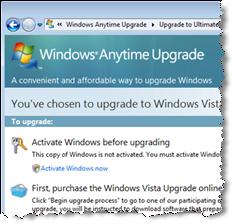Will Windows Vista be worth the wait?

It's been a long and winding road, but Windows Vista is finally released to manufacturing. That means the final stage of the waiting game has begun. According to Microsoft, Volume Licensing customers will receive media containing Business and Enterprise editions of Windows Vista by the end of this month, with Ultimate edition available via download. Giant PC makers will get those bits as well, and retail customers will be able to buy Windows Vista on new PCs or in retail boxes by the end of January. (Those rumors that Vista will be publicly unveiled at the Consumer Electronics Show in early January? No way, say my sources.)
I've been working with an escrow build of the final release code since last Friday. What's new and what's changed in the gold RTM bits? The last little pieces of UI bling - some fancy icons, new wallpapers, and the long-awaited Robert Fripp-created sounds - are included, and the feature set is locked down. For a full walkthrough, see the detailed image gallery I've put together:
A first look at Windows Vista (finally!)
You'll no doubt be overwhelmed with coverage of the minutiae of Windows Vista in the next few days and weeks, but focusing on the road behind or on pixel-by-pixel inspections is a waste of time. After nearly a year of working with Windows Vista day in and day out in production environments, I've come up with three questions that every Windows user needs to ask about Windows Vista.
Does it work?
On shiny clean desktop hardware, with new Vista drivers, this version of Windows works exceptionally well. I've installed the RTM bits on a new dual-core desktop from Dell; a two-year-old Pentium 4 system, also from Dell; a custom-built system with an Intel motherboard and a Pentium D processor; and even a much-upgraded 2002-vintage Pentium 4 system. In all four cases, setup was flawless. The new image-based setup scheme doesn't quite hit the 15-minute benchmark that Windows boss Jim Allchin promised at the beginning of the year, but on a fast system a clean setup typically completes in 20-30 minutes, mostly unattended.
Upgrading over an existing installation is a little more problematic, especially on notebooks and offbeat hardware. My upgrade experience with a top-of-the-line Acer Tablet PC has been problematic for months, and the final build fails with a Blue Screen of Death, thanks to a conflict with the onboard Realtek sound circuitry. A clean setup works better, but is still far from perfect. Similarly, trying to set up Windows Vista on a Shuttle small-form-factor PC - as a clean setup or an upgrade - fails every time. (Microsoft says they're unable to reproduce the problem on a similar system.)
Over the past six months, I've kept track of countless bugs in Vista. Most are fixed, and I have yet to bump into a so-called showstopper. That doesn't mean this RTM build of Vista is perfect; far from it. There are still plenty of small glitches. If you move the data folders out of the user profile and onto a separate partition, for instance, the search index doesn't get updated, and some programs (including Windows Live Messenger) still look for data in the old locations.
Microsoft argues that some setup problems will disappear early next year as hardware manufacturers finally get around to releasing Vista-compatible drivers. For now, anyone considering a Vista upgrade needs to pay special attention to driver availability.
What's in it for me?
The image gallery I've put together hits the highlights of Windows Vista, and anyone who dismisses Vista as a minor update is missing the point. Much of the underlying architecture of Windows Vista has been completely reworked, which has the potential to make it more reliable and more secure than XP. Whether Windows Vista can live up to that potential, only time will tell. Yes, a few highly touted Vista features are also available for Windows XP, including Windows Defender and Windows Media Player 11. But the laundry list of new Vista-only features is impressive.
- A radically revamped Windows Explorer with integrated Desktop Search capabilities
- A completely rewritten networking stack that supports IPv6
- A two-way firewall that increases protection for many existing Windows services
- New audio, display, and power management architectures
- User Account Control, IE7 Protected Mode, and Bitlocker Drive Encryption
- Windows Photo Gallery, with industry-standard support for saving metadata in image files
- Excellent backup tools, including the ability to recover previous versions of a file
- SuperFetch, ReadyBoost, and other performance-enhancing innovations
- Tablet PC support
- A slick and stable upgrade to Windows Media Center
Ultimately, the experience of using Windows Vista is more important than any feature on that list. I've talked to dozens of beta testers, and reactions to Vista are mixed. The majority give it a thumbs up, but a significant minority are turned off by the new UI, by the hassles of User Account Control, or by issues like licensing and cost.
Is it worth it?
That's the $399 question, isn't it? Microsoft's done a terrible job of communicating the differences between the many editions, and the eye-popping $399 retail price tag on Windows Vista Ultimate Edition has put off some enthusiasts.
The recent hassle over Vista licensing certainly didn't help Microsoft's cause, and trepidation over the successor to Windows Genuine Advantage, the Windows Software Protection Platform doesn't help either. It's possible that Microsoft has permanently alienated some of its most loyal customers.
Between now and the end of January, Microsoft and its PC-building partners will no doubt roll out irresistible upgrade offers. For Windows users, there's no hurry to make a decision.
